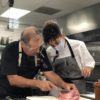What is the Experience Needed to be a Chef?

Becoming a chef can be an exciting career choice. If you love to cook and you’d love to get paid to do it, why not turn that passion into reality.
Figuring out the experience needed to be a chef and where to get started can be tricky. Though many chefs will say previous experience is not necessary, you will need to gain some knowledge before you apply for that dream job in your dream restaurant.
The options are endless. Top culinary schools provide a coveted certificate, but they can also cost a lot of money and take years to complete. You could work your way up through the ranks starting at a diner or fast-food restaurant where you can hone your chef knowledge and skills.
Sometimes, the right choice is something in between. Hybrid schools, like the one I attended, offer an education taught by professional cooks in a professional setting, but at a cost and timeframe much cheaper and quicker than a two- or four-year culinary school. CulinaryLab in Tustin, Ca., works to place its students into a paid apprenticeship at a high-end restaurant after just a few months of schooling. This helps students with no experience leapfrog into a position they would not otherwise be qualified to land.
Hiring chefs at top restaurants will say they don’t rely too much on experience. Where you came from means less to them than where they envision your future with them. They say they can turn any newbie into a seasoned kitchen veteran — as long as you have the work ethic and the drive they so desperately want.
A Chefs’ perspective – Qualities of a Good Cook
“I don’t care if you have experience or not. What is important is if you have common sense,” says Jimmy Olang, corporate executive chef at 24 Carrots Catering and Events in Costa Mesa.
“Overall, I’ll take a great attitude and a great work ethic over a guy who has a lot of experience.”
Chef Jo-jo Doyle says that at The Honda Center in Anaheim, where he is executive chef and director of operations, he oversees 700 employees and interviews up to 50 aspiring chefs and culinary workers at a time as The Honda Center approaches its busy season. He’s actually sometimes turned off by candidates who have years of experience in the industry.
“Most of the time, people with a lot of experience are d***heads. No experience, with a kickass attitude, beats experience with a bad attitude every day.”
Chef Doyle says he once hired a man with no experience at a restaurant in Atlanta. “He walked into this country, couldn’t speak English. He got his green card and worked his way up from a dishwasher into a sous chef at a major arena. He was a monster. He was organized, didn’t crack under pressure and he got the job done.
“You’d be surprised at how far you can go with a good attitude,” he said.
Likewise, Chef Olang described an employee “who has been with the company for at least five years. He started out as a dishwasher, then a prep cook, and now he does tastings for us and he’s a lead chef. We like when they work from the bottom up,” he said.
Getting Hired – 5 Steps to Get The Experience Needed to be a Chef
Before hiring, many chefs will conduct a brief in-person interview and assign what is called a “stage.”
Stage is a French term that means unpaid internship or test. The interviewee is often asked to cook a certain dish off the menu or to stand-in for a few hours on the line. During this time, a chef can observe a person’s overall ability to cook and handle his or herself in the kitchen.
Sometimes, they’ll even ask for a long-term internship before making their final decision to hire someone.
With absolutely zero experience, you probably have no shot at getting in for the interview at a successful, prestigious restaurant. Most aspiring chefs have to have at least some experience before being brought in for an interview, a stage, or an internship.
But there are ways to prepare for the process without taking the long, expensive road.
Before applying for a job, ask yourself, “Do I mark off all the boxes for a great employee?”:
- Positive attitude
- Passion for cooking
- Strong work ethic
- Willingness to learn
- Get along with others
- Flexible
If you answered yes to all of those, you may be ready to sidestep the long and expensive rituals and proceed to these five steps that will help you get a foot in the door quickly and cheaply:
1. Read Cookbooks
Chef Doyle, who has been cooking professionally for almost 30 years, says one of the best things aspiring cooks should do is read as much as possible. He says “read every cookbook you can find.” Read about successful chefs. Read about restaurants. Read cookbooks. Gaining knowledge of the industry will help you understand the ins and outs of the business.
2. Go Out to Dinner
Chef Doyle also advises his new cooks to go out to eat. Hit the top restaurants in your area. Not just to enjoy a nice meal but more so to study the way the food is prepared, and how it is presented. Make a note of what ingredients went into the dish, and what techniques must have been used to make it. Also, ask to talk to the chef. Ask questions of the servers and bartenders. Study the menu.
3. Learn From Neighbors
Attend weekend workshops or cooking parties. In most cities, you can find kitchen stores, churches or schools that offer low- or no-cost cooking workshops on the weekends. This is a great way to learn techniques and ask questions among people who know and love food.
4. Practice at Home
Of course, the internet is a great place to help you hone your skills. How-to videos on youtube.com can teach you recipes, or guide you while you practice the skills needed for general kitchen basics — chopping vegetables, sauteeing mushrooms or fabricating a chicken. Or you can learn more specific skills such as how to cook modern Asian cuisine.
5. Single Out Your Restaurant
Narrow the wish list of restaurants that you dream of working for down to two or three. Before you walk in the door as a job-seeker, learn everything you can about that restaurant. Read its website. Memorize its menu. Observe the entire staff. Ask questions. When was the restaurant opened? Why did the owners choose this location? Why do people like it? Then go home and try to replicate some of its most popular dishes.
Once you’ve mastered all of this, you still won’t have on-the-job restaurant experience that many of your competitors will. But what you will gain is industry knowledge to help get you in the door, the work-ethic and the drive to nail the interview, and now the basic skills to ace the stage.
And for some chefs, that’s really what they’re looking for.
Author Bio
After 30 years in the newspaper industry, Orange County native Joe Ardent decided to put down the press pass in favor of a chef coat. Joe was a reporter, editor and page designer at the Orange County Register and The Press-Enterprise in Riverside, CA. He interviewed professional athletes, rock stars, comedians and others during the 1990s and 2000s. In 2018, he set out to pursue his dream in the food industry.










